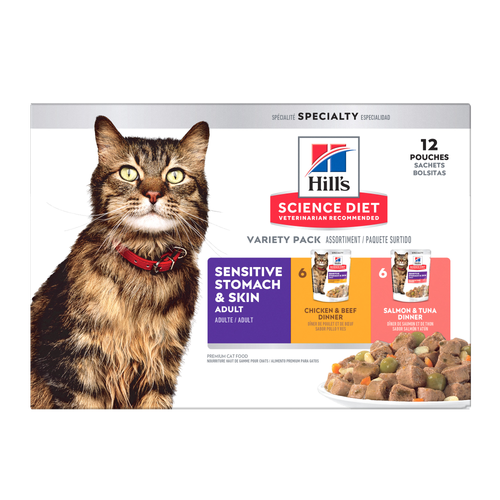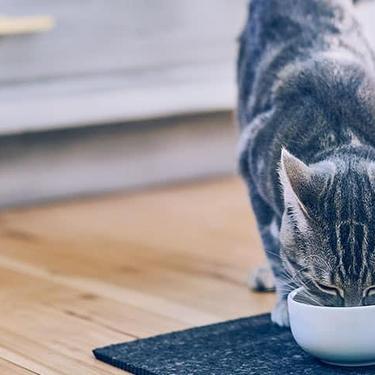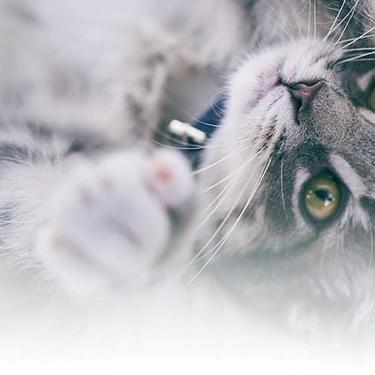
-
Find the right food for your petTake this quiz to see which food may be the best for your furry friend.Find the right food for your petTake this quiz to see which food may be the best for your furry friend.Health CategoryFeatured products
 Hill's Science Diet Adult Healthy Mobility Large Breed Chicken Meal, Barley & Brown Rice Recipe Dog Food
Hill's Science Diet Adult Healthy Mobility Large Breed Chicken Meal, Barley & Brown Rice Recipe Dog FoodAdvanced nutrition shown to support joint health and improve mobility
Shop Now Adult Light Large Breed Chicken Meal & Barley Recipe Dog Food
Adult Light Large Breed Chicken Meal & Barley Recipe Dog FoodFewer calories for less active large breed dogs
Shop Now Adult Large Breed Chicken & Barley Recipe Dog Food
Adult Large Breed Chicken & Barley Recipe Dog FoodSupports healthy joints, lean muscle, and beautiful coat for large breed dogs
Shop NowFeatured products Adult Sensitive Stomach & Skin Pouch Variety 12 Pack Cat Food, Chicken & Beef, Salmon & Tuna
Adult Sensitive Stomach & Skin Pouch Variety 12 Pack Cat Food, Chicken & Beef, Salmon & TunaCarefully made, gourmet daily nutrition. Tasty chunks with Salmon & Tuna in a decadent gravy. Supports digestive health, nourishes skin and promotes a lustrous fur.
Shop Now Adult Oral Care Chicken & Brown Rice Recipe Cat Food
Adult Oral Care Chicken & Brown Rice Recipe Cat FoodClinically proven kibble technology to reduce plaque & tartar build-up
Shop Now Adult Perfect Digestion Chicken, Barley & Whole Oats Recipe Cat Food
Adult Perfect Digestion Chicken, Barley & Whole Oats Recipe Cat FoodHill's Science Diet's breakthrough nutrition supports ultimate digestive well-being & healthy microbiome
Shop Now -
DogCat
- Cat Tips & Articles
-
Health Category
- Weight
- Skin & Food Sensitivities
- Urinary
- Digestive
- Kidney
- Dental
- Serious Illness
-
Life Stage
- Kitten Nutrition
- Adult Nutrition
Featured articles Adopting a Pet: What You Need to Know
Adopting a Pet: What You Need to KnowLearn the basics of adopting a pet, including where to begin and common questions you should ask yourself when deciding which kind of pet is best for you.
Read More Fun Ideas for Kids and Pets This Summer
Fun Ideas for Kids and Pets This SummerOutdoor summer activities with your dog or cat can be fun for kids, too. Learn how they also teach kids responsibility & creates a bond with their pet.
Read More Cat vs. Dog: Which Is the Best Pet for Me?
Cat vs. Dog: Which Is the Best Pet for Me?Learn about important differences between dogs and cats, such as cost & space considerations. These factors can help you decide which pet is best for you.
Read More -


Providing your cat with a happy lifestyle is what being a pet parent is all about, and it starts with their food. Along with plenty of fresh cool water, cats needs the best food for their stage in life--one that includes protein, carbohydrates, certain types of fats, and essential vitamins and minerals.
There are plenty of healthy cat food options on the market. But with so many products to choose from, where do you begin?
Meats vs. Meat Flavors
The first step to identifying the best cat food is to familiarise yourself with the products' ingredients. Keep in mind items are organised according to weight, PetMD points out, with the heaviest appearing first. You typically see the main meat product listed first or second because it has the highest weight (which includes water content).
If a pet food product in the US is labelled as having a single ingredient ("tuna," for instance), according to the Association of American Feed Control Officials (AAFCO), it must contain at least 95 percent of that food product. For products advertised as "with tuna", AAFCO requires that it only has to include 3 percent of that product. Tuna "flavoured" on the other hand, means that there has to be enough so that a cat can discern the difference.
Once you start reading labels this closely, you'll notice common ingredients that appear in cat food, particularly the following items:
- Chicken, tuna, beef, corn, barley or wheat. Protein is important because it provides the necessary building blocks for muscle and contributes to the energy your cat needs from food.
- Wheat, corn, soy, barley, and oats. In addition to protein, animals use carbohydrates for energy.
Just like with our own foods, it's important to know where the advertised food items appear on the ingredients list and why. Keep in mind, though, that a key ingredient may appear lower in the list because of its density, not for a lack of nutrition.
Common Vitamins
Along with proteins and carbohydrates, the best cat food has the vitamins that are essential to keeping a cat healthy.
- Vitamin A: typically in the form of beta-carotene, for healthy skin, vision, and immune system.
- B vitamins: including biotin (B7), riboflavin (B2), or pyridoxine (B6), niacin (B3), and thiamin (B1) for maintaining a strong nervous system and most vital organs. Thiamin is especially important in cats who are often predisposed to deficiency here.
- Folic Acid, or B9: a water-soluble vitamin that aids digestion and promotes healthy cell growth, which is especially important for kittens and pregnant cats.
- Vitamin B12 supplement: also helpful for proper cell growth (both blood and nerve).
- Vitamins C and E, antioxidants that are crucial to the resilience of your cat's immune system.


Tasty Tips
Common Minerals
Minerals needed by cats aren't that dissimilar to those you need.
They include:
- Calcium, which keeps your cat's bones, joints, and teeth healthy.
- Phosphorous, builds healthy teeth and bones alongside calcium.
- Iron, an element in mammal cells, used as a component of haemoglobin in red blood cells. These are the cells that carry oxygen from the lungs to the rest of the body.
- Magnesium, important for all sorts of body processes, such as building strong bones, producing energy, and regulating blood pressure.
- Sodium, which maintains normal blood pressure as well.
- Zinc, needed to make the body's proteins as well as its DNA.
A healthy cat food will include these essential elements to provide your pet with a nutritious and well-balanced meal. Don't forget pet food ingredients are usually regulated by the product's home country's food and drug governing body, which should be of some additional comfort to pet parents.
Age and Weight
Your cat's nutritional needs change depending on circumstances such as age and weight, so speak with your veterinarian to determine which cat food is best. If you have a kitten, you know just how much energy they have. And because a kitten's body changes a lot during the first year; body weight will double or even triple in the first few weeks alone, kittens need an abundance of nutrients for healthy living. These can be found in a food that's formulated especially for kittens: those that include nutrients such as DHA (found in fish oil) to aid brain and eye development, and folic acid to promote healthy cell growth.
Adult cats (ages one through six) and mature cats (ages seven through ten) should be fed according to their weight and level of activity. Cats who are eleven or older are considered senior pets, and their nutritional requirements reflect the changes that come with age. Key ingredients may include calcium to aid aging bones and joints, vitamins E and C to boost the immune system, or vegetable oil that contains omega fatty acids to keep coat and skin soft and smooth. Work closely with your vet to determine which type of food will benefit your furry friend, and keep in mind that older cats tend to gain weight as their activity level decreases.
If your cat is overweight, they’re not alone. The Telegraph reports one in four cats are considered obese in the UK, and it's not always due to old age. Cats become overweight when they consume more food than they work off with exercise. But before switching your cat's food to one specifically for weight loss, check with your vet to see if there is an underlying cause for the weight gain such as an illness or related health issue.
One of the first things you should do to revamp your feline's food is stop feeding too many treats. Cats aren't too keen to "dieting," as you can imagine, but luckily there are foods to work with their metabolisms to make the transition easier.
Where to Buy
It's easy to get your cat a product that fills the bowl, but to be sure you're getting the best cat food for your furry friend, shop with your veterinarian or retailers that offer a wide variety to choose from. Whatever your preference, a good rule is to always buy your pet food products from your veterinarian, or a store and company you trust.
Whether you're a new or a seasoned cat parent, you and your furry friend will thrive from choosing the best cat food for, one that will keep your cat healthy and active throughout life.


Christine O'Brien is a writer, mom, and long-time cat parent whose two Russian Blues rule the house. Her work also appears in Care.com, What to Expect, and Fit Pregnancy, where she writes about pets, pregnancy, and family life. Find and follow her on Instagram and Twitter @brovelliobrien.
Related products

Clinically proven kibble technology to reduce plaque & tartar build-up

Carefully made, gourmet daily nutrition. Tasty chunks with Salmon & Tuna in a decadent gravy. Supports digestive health, nourishes skin and promotes a lustrous fur.

Delicious tender chicken and rice in a mouthwatering sauce with precisely balanced nutrition to support 5 essential building blocks for lifelong health

Hill's Science Diet's breakthrough nutrition supports ultimate digestive well-being & healthy microbiome
Related articles

Understand the symptoms of a chronic upset stomach in your cat, and learn how to help sooth their discomfort.

Get helpful information on proper feline oral healthcare and why it's so vital to take care of your cat's teeth.

Provide the best possible treatment for cats with sensitive skin by spotting the signs, knowing the causes, and understanding the remedies. Learn more now.

Obesity affects more than 30 percent of cats in America. Learn how you can properly feed and exercise your cat to improve its weight management.

Put your cat on a diet without them knowing
Our low calorie formula helps you control your cat's weight. It's packed with high-quality protein for building lean muscles, and made with purposeful ingredients for a flavorful, nutritious meal. Clinically proven antioxidants, Vitamin C+E, help promote a healthy immune system.
Put your cat on a diet without them knowing
Our low calorie formula helps you control your cat's weight. It's packed with high-quality protein for building lean muscles, and made with purposeful ingredients for a flavorful, nutritious meal. Clinically proven antioxidants, Vitamin C+E, help promote a healthy immune system.

